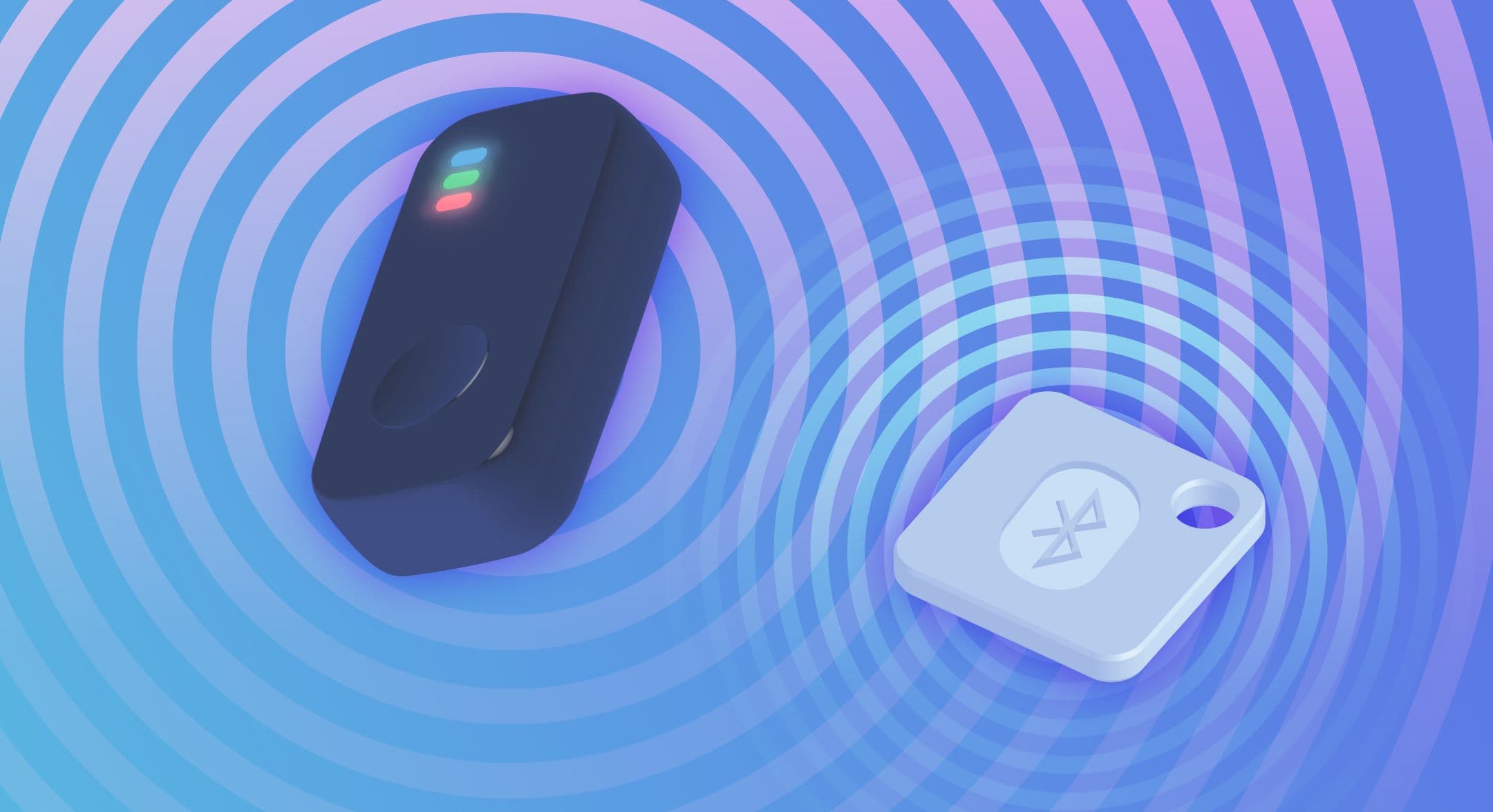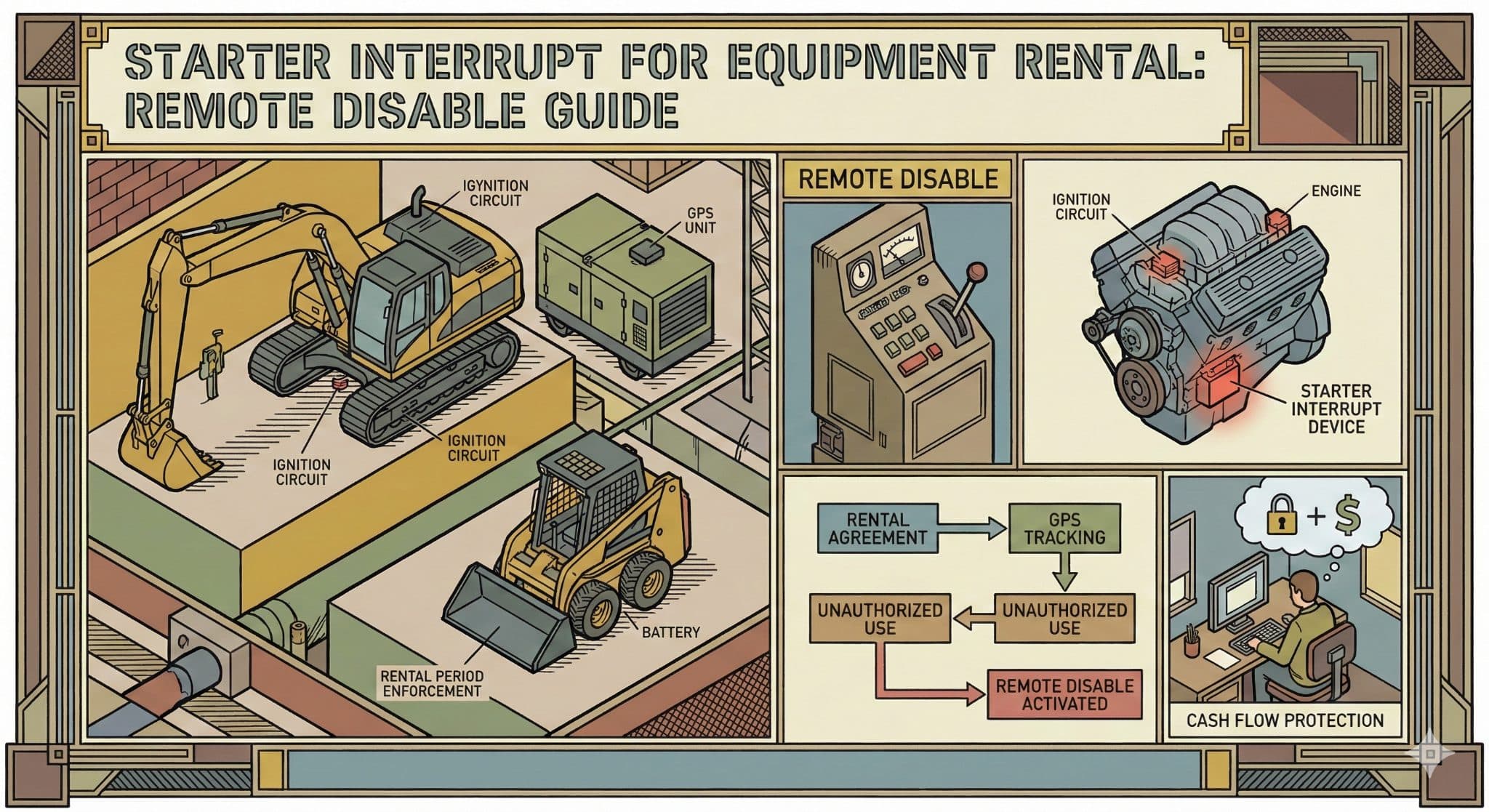Last updated: February 2026
Key Takeaways
- Bluetooth tracking works within 30-40 meters using short-range radio waves, while GPS covers vast distances via satellite networks
- GPS tracking requires cellular/SIM connectivity and ongoing power, while Bluetooth trackers have excellent battery life (up to 12 months)
- Bluetooth excels for personal items (keys, wallets, luggage); GPS is essential for vehicle monitoring, delivery tracking, and real-time fleet management
- GPS provides historical location data and detailed analytics; Bluetooth offers simple proximity alerts and geofence notifications
- Choose Bluetooth for small personal assets, GPS for long-distance tracking and operational fleet visibility
Google Maps. Apple Watch. Find My iPhone. Pokémon Go.
If you haven't noticed, your devices have gotten smarter over the last 10–15 years. We used to be stuck with flimsy maps that were five inches thick when folded and five feet long when spread out. Today, a robotic voice on our phone tells us where to go with scary precision.
These innovations have a common denominator: tracking systems. And there are two that most of us can access on a daily basis: Bluetooth tracking and GPS tracking.
GPS has been around for decades (more on that in a bit), but with Bluetooth tracking starting to grow in popularity, many people confuse the two. More specifically, they believe they can track the same things with Bluetooth that they can with GPS. Spoiler alert: This is not the case.
This blog post thoroughly explains the two technologies, how they differ, and the best uses for each.
What is Bluetooth Tracking?
Bluetooth trackers are tiny devices you can attach to various items—like your wallet, keys, purse, or other objects. The devices connect to your smartphone (or other BLE enabled devices) via Bluetooth, which means you can easily locate them whenever they're lost.
Bluetooth works via radio waves using a short-range wireless communication technology. Bluetooth trackers typically have a range of accuracy of about 100-130 feet. They are susceptible to interference from other devices.
When you get a Bluetooth tracker, you'll generally use an app that allows you to track your tagged items. Each tracker has a unique signature that only you, the owner, know—which prevents outsiders from gaining access to your data.
Let's say you try to leave the house, but you can't find your keys. Instead of checking all the places they could be—and falling further behind schedule by the second—you check the app to instantly see their location.
But what if you've lost connection to the device and can no longer see the location of your keys?
The app has you covered once again. From it, you can activate an alarm that sounds from the tracking device, allowing you or those around the object to find it by following the noise. Think of it as an automated solution to the classic, "I lost my phone. Can you call it?"
Bluetooth trackers can also send notifications to your phone when you've left a tracked item behind. No more driving 20 minutes down the road only to realize you forgot your wallet—your phone will warn you before you even leave the neighborhood!
What is GPS Tracking?
GPS uses devices on the ground to send signals to a network of 24 orbiting satellites. This system makes it easy for GPS trackers to locate a person or item with a precision that is generally much finer than Bluetooth, approximately with 15-30 feet.
Unlike Bluetooth tracking, GPS tracking has been used for decades. Introduced in the 1960s, it was first created for strictly military use. Today, it helps your 10-year-old nephew collect Pokémon.
Have you ever wondered how applications like DoorDash know where your delivery driver is? Or how your Garmin watch knows how many miles you've run, and where? The answer: GPS tracking.
Similar to Bluetooth, businesses and consumers can (and often do) use GPS tracking for everyday purposes. With a GPS tracking device, delivery businesses (like DoorDash) can get instant updates when a driver picks up an order, makes a pit stop, and arrives at their destination. In construction and field service industries, GPS tracking enables more accurate project planning and resource allocation.
The tracking device must be connected to the internet, which it does through integration with a SIM card. Once you've attached your tracking hardware to the object you want to track (like a delivery truck), it works with a software app to show you where the object currently is. And because GPS satellites cover virtually the entire surface of the Earth, you typically won't lose connection—even if the item goes outside of the country or into a remote area.
What are the Differences and Similarities Between Bluetooth and GPS Tracking?
By now, you've likely done a little comparing and contrasting in your head. But if you're still struggling to decide which tracking system you should settle on, let's clearly define their similarities and differences.
Bluetooth and GPS Differences
- Distance covered: The first (and perhaps most important) difference between Bluetooth and GPS tracking is the range of distance each technology is able to cover. Bluetooth devices only cover 30-40 meters on average, and once the tracked item is outside of this range, it loses its connection to the tracking app. GPS, on the other hand, covers long distances and tracks items and people in motion (not just at a standstill).
- Ability to monitor vehicles: Because Bluetooth is much more limited in terms of distance coverage, it's basically impossible to track vehicles with this technology. It's much better for tracking personal belongings. For vehicle monitoring, GPS trackers designed for heavy equipment are the industry standard.
- Power and battery: Many GPS trackers either get their power from a vehicle's electrical system or have self-contained batteries. Bluetooth trackers, however, usually last 12 months and tend to have lower battery consumption. Just remember to keep your phone charged. Generally Bluetooth trackers will have a much longer life than a battery-powered GPS tracker.
- Reliance on proximity to a phone: Bluetooth only works when it's in close distance to a phone or other BLE device. GPS on the other hand does not need to be connected to anything other than GPS satellites.
- Size: Bluetooth trackers will generally be much smaller than GPS Trackers making them more suitable for small items like keys or tools.
Bluetooth and GPS Similarities
- Low price point: You can find Bluetooth trackers for $10–$25 and GPS trackers for around $40. The Bluetooth option is cheaper, but both are quite affordable. However, keep in mind that pricing also depends on which type of GPS tracker you use—some can go way over $50. With GPS Trackers, you will generally have to pay for cellular or satellite data on a monthly basis on top of the hardware expense.
- Water resistance: Bluetooth trackers are water-resistant (meaning they can't be fully submerged), while most GPS trackers are 100% waterproof (meaning they can be fully submerged).
- Location history: Sometimes, knowing where an item was is just as important as knowing where it currently is. Both Bluetooth and GPS tracking devices give you a glimpse into the past so you know the full history of your tracked item's journey.
- Notifications or updates: Bluetooth tracking systems send notifications when you've traveled a certain distance without your tracked item. GPS tracking systems send geofence alerts based on the triggers you set. For example, you may choose to receive notifications each time an item leaves a defined boundary or stops for more than a certain amount of time.
See How Hapn Works for Your Fleet
Get a personalized walkthrough and transparent pricing — no commitment required.
Get Pricing →When Should I Use Bluetooth Tracking vs. GPS Tracking?
Both technologies are quite versatile, but there are certain use cases that lend themselves to one solution over the other. Here are some of the most common ones.
Bluetooth Tracking
Know where your small personal belongings are at all times.
I said it already, so I'll keep this short and sweet: Bluetooth tracking is the absolute best way to keep track of your personal belongings—keys, wallet, purse, backpack, phone, chargers, and the like.
Never lose your remote.
Picture this: you just sat down after a long workday, blanket over your lap and dinner plate in hand—only to realize the TV remote is not at its usual station on the couch armrest.
Now, you not only have to get up from your comfortable position—you also have to embark on a hunt. With a Bluetooth tracker, this wouldn't be a problem. You'd simply pull up the app on your smartphone and immediately see where the remote wandered off to this time.
Find your parked car.
Another common problem that Bluetooth tracking can easily solve: forgetting where you parked the car. Simply tag the device to your car and pull out your app once you've re-entered the parking lot.
Keep track of your luggage while traveling.
Losing luggage while traveling happens more often than you might think. With a Bluetooth tracker, you can recover your bag immediately should the need arise.
GPS Tracking
Find your lost pet.
Dogs and cats go missing all the time. Sometimes, they're only gone for an hour. But if the thrill of adventure takes Fido away for a few days or more, it can leave us humans feeling beside ourselves.
Because Bluetooth trackers can only locate tagged items within 30–40 meters, you'll need to use a GPS device to monitor your pet's whereabouts. The good news is that many devices are compact enough to easily fit on your pet's collar.
Monitor delivery drivers.
GPS tracking is becoming a popular solution for delivery and mobile service businesses. Not only can you see how much progress your drivers have made on their journeys, but you can also provide customers with accurate updates on their order arrival times. Learn more about GPS tracking for fleet management here.
Track military troops and vehicles.
As I mentioned earlier, GPS tracking was first used solely for military purposes, and it is still used today to track troop movements, aircraft, sea navigation, and units stationed in unfamiliar locations.
What's more, Unmanned Aerial Vehicles (UAVs, or "drones") are made possible by GPS tracking. This technological advancement further protects those in service, as it allows them to see and operate in extremely dangerous locations.
Recover stolen items.
Tracking high-value assets, equipment, or inventory with GPS devices makes recovering them in the event of theft a piece of cake (assuming the thief doesn't know they're being tracked). Understanding fleet utilization benchmarks can help optimize recovery operations.
For example, many car dealerships lean on GPS to track vehicles in their lots. Learn more about GPS tracking for asset monitoring here.
Log recreational activities and exercise.
Runners, hikers, and cyclists are just a few hobbyists who leverage GPS tracking for recreational purposes—although they might not know it. Watches that track your distance and pace, for example, exist thanks to GPS.
Bluetooth and GPS tracking are multipurpose technologies used every day around the entire world. Whether you're optimizing a fleet of business vehicles or simply trying to remember where you put those darn keys, you can harness the power of one (or both) of these systems to make your life a little easier
Frequently Asked Questions
What is the main difference between Bluetooth and GPS tracking?
The primary difference is range and connectivity. Bluetooth trackers work within 30-40 meters using short-range radio waves and require proximity to a paired smartphone. GPS trackers cover unlimited distances via satellite networks and require cellular connectivity but don't depend on a phone being nearby. Bluetooth is ideal for personal items; GPS is essential for vehicle and long-distance tracking.
Can Bluetooth trackers be used for vehicle tracking?
No, Bluetooth trackers are not suitable for vehicle tracking due to their limited 30-40 meter range. Once a vehicle travels beyond this distance, the Bluetooth connection is lost. GPS trackers are the appropriate solution for vehicle monitoring as they provide real-time location tracking across any distance using satellite networks.
How long do Bluetooth tracker batteries last compared to GPS trackers?
Bluetooth trackers typically last 12 months on a single battery charge because they use minimal power for passive tracking. GPS trackers, especially those with continuous real-time tracking, consume much more power and typically require daily or weekly charging, or they can be hardwired to vehicle power systems for continuous operation.
What is the cost difference between Bluetooth and GPS tracking?
Bluetooth trackers are generally cheaper upfront ($10-25) with no ongoing costs. GPS trackers cost more initially ($40+) and require monthly cellular or satellite data subscriptions (typically $15-50/month). For budget-conscious personal item tracking, Bluetooth is more economical. For business fleet operations, GPS provides better value through operational efficiency gains.
Can GPS trackers work without cellular coverage?
GPS devices can determine location using satellite signals without cellular coverage. However, to transmit that location data to your phone or dashboard, they need cellular, satellite, or internet connectivity. In areas with no coverage, the tracker stores data locally and transmits when coverage is restored. Dual-network SIM cards improve reliability in spotty coverage areas.
Written by the Hapn Team — Hapn provides full-stack fleet and asset telematics for construction, rental, and field service companies. Learn more →


